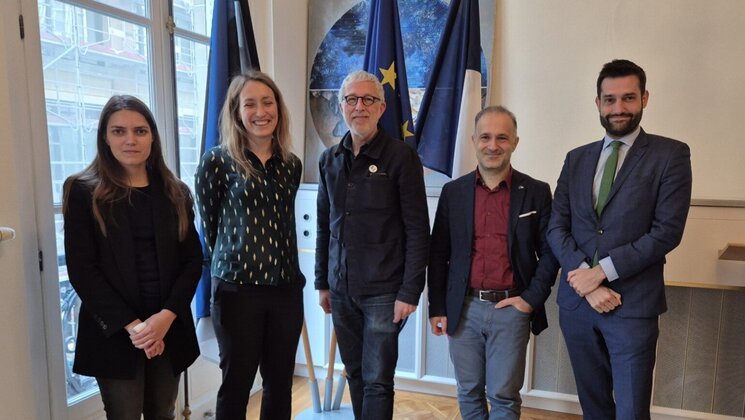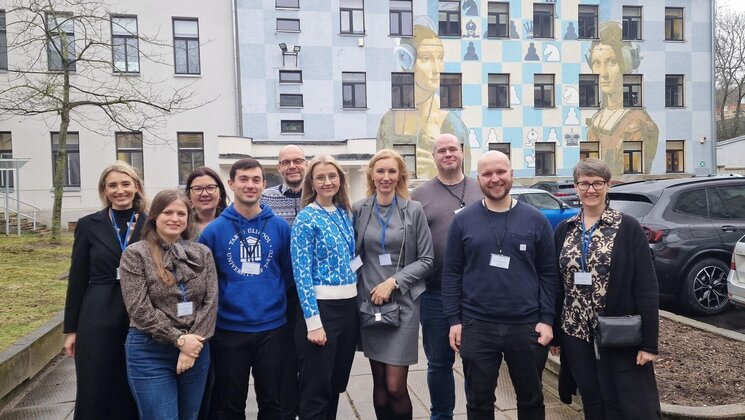-
Faculty of Arts and HumanitiesDean's Office, Faculty of Arts and HumanitiesJakobi 2, r 116-121 51005 Tartu linn, Tartu linn, Tartumaa EST0Institute of History and ArchaeologyJakobi 2 51005 Tartu linn, Tartu linn, Tartumaa EST0Institute of Estonian and General LinguisticsJakobi 2, IV korrus 51005 Tartu linn, Tartu linn, Tartumaa EST0Institute of Philosophy and SemioticsJakobi 2, III korrus, ruumid 302-337 51005 Tartu linn, Tartu linn, Tartumaa EST0Institute of Cultural ResearchÜlikooli 16 51003 Tartu linn, Tartu linn, Tartumaa EST0Institute of Foreign Languages and CulturesLossi 3 51003 Tartu linn, Tartu linn, Tartumaa EST0School of Theology and Religious StudiesÜlikooli 18 50090 Tartu linn, Tartu linn, Tartumaa EST0Viljandi Culture AcademyPosti 1 71004 Viljandi linn, Viljandimaa EST0Professors emeriti, Faculty of Arts and Humanities0Associate Professors emeriti, Faculty of Arts and Humanities0Faculty of Social SciencesDean's Office, Faculty of Social SciencesLossi 36 51003 Tartu linn, Tartu linn, Tartumaa EST0Institute of EducationJakobi 5 51005 Tartu linn, Tartu linn, Tartumaa EST0Johan Skytte Institute of Political StudiesLossi 36, ruum 301 51003 Tartu linn, Tartu linn, Tartumaa EST0School of Economics and Business AdministrationNarva mnt 18 51009 Tartu linn, Tartu linn, Tartumaa EST0Institute of PsychologyNäituse 2 50409 Tartu linn, Tartu linn, Tartumaa EST0School of LawNäituse 20 - 324 50409 Tartu linn, Tartu linn, Tartumaa EST0Institute of Social StudiesLossi 36 51003 Tartu linn, Tartu linn, Tartumaa EST0Narva CollegeRaekoja plats 2 20307 Narva linn, Ida-Virumaa EST0Pärnu CollegeRingi 35 80012 Pärnu linn, Pärnu linn, Pärnumaa EST0Professors emeriti, Faculty of Social Sciences0Associate Professors emeriti, Faculty of Social Sciences0Faculty of MedicineDean's Office, Faculty of MedicineRavila 19 50411 Tartu linn, Tartu linn, Tartumaa ESTInstitute of Biomedicine and Translational MedicineBiomeedikum, Ravila 19 50411 Tartu linn, Tartu linn, Tartumaa ESTInstitute of PharmacyNooruse 1 50411 Tartu linn, Tartu linn, Tartumaa ESTInstitute of DentistryL. Puusepa 1a 50406 Tartu linn, Tartu linn, Tartumaa ESTInstitute of Clinical MedicineL. Puusepa 8 50406 Tartu linn, Tartu linn, Tartumaa ESTInstitute of Family Medicine and Public HealthRavila 19 50411 Tartu linn, Tartu linn, Tartumaa ESTInstitute of Sport Sciences and PhysiotherapyUjula 4 51008 Tartu linn, Tartu linn, Tartumaa ESTProfessors emeriti, Faculty of Medicine0Associate Professors emeriti, Faculty of Medicine0Faculty of Science and TechnologyDean's Office, Faculty of Science and TechnologyVanemuise 46 - 208 51003 Tartu linn, Tartu linn, Tartumaa ESTInstitute of Computer ScienceNarva mnt 18 51009 Tartu linn, Tartu linn, Tartumaa ESTInstitute of GenomicsRiia 23b/2 51010 Tartu linn, Tartu linn, Tartumaa ESTEstonian Marine Institute0Institute of PhysicsInstitute of ChemistryRavila 14a 50411 Tartu linn, Tartu linn, Tartumaa EST0Institute of Mathematics and StatisticsNarva mnt 18 51009 Tartu linn, Tartu linn, Tartumaa EST0Institute of Molecular and Cell BiologyRiia 23, 23b - 134 51010 Tartu linn, Tartu linn, Tartumaa ESTTartu ObservatoryObservatooriumi 1 61602 Tõravere alevik, Nõo vald, Tartumaa EST0Institute of TechnologyNooruse 1 50411 Tartu linn, Tartu linn, Tartumaa ESTInstitute of Ecology and Earth SciencesJ. Liivi tn 2 50409 Tartu linn, Tartu linn, Tartumaa ESTProfessors emeriti, Faculty of Science and Technology0Associate Professors emeriti, Faculty of Science and Technology0Institute of BioengineeringArea of Academic SecretaryHuman Resources OfficeUppsala 6, Lossi 36 51003 Tartu linn, Tartu linn, Tartumaa EST0Area of Head of FinanceFinance Office0Area of Director of AdministrationInformation Technology Office0Administrative OfficeÜlikooli 17 (III korrus) 51005 Tartu linn, Tartu linn, Tartumaa EST0Estates Office0Marketing and Communication OfficeÜlikooli 18, ruumid 102, 104, 209, 210 50090 Tartu linn, Tartu linn, Tartumaa EST0Area of Vice Rector for ResearchUniversity of Tartu LibraryW. Struve 1 50091 Tartu linn, Tartu linn, Tartumaa EST0Grant OfficeArea of Vice Rector for DevelopmentCentre for Entrepreneurship and InnovationNarva mnt 18 51009 Tartu linn, Tartu linn, Tartumaa EST0University of Tartu Natural History Museum and Botanical GardenVanemuise 46 51003 Tartu linn, Tartu linn, Tartumaa EST0International Cooperation and Protocol Office0University of Tartu MuseumLossi 25 51003 Tartu linn, Tartu linn, Tartumaa EST0Area of RectorRector's Strategy OfficeInternal Audit OfficeArea of Vice Rector for Academic AffairsOffice of Academic Affairs0University of Tartu Youth AcademyUppsala 10 51003 Tartu linn, Tartu linn, Tartumaa EST0Student Union OfficeÜlikooli 18b 51005 Tartu linn, Tartu linn, Tartumaa EST0Centre for Learning and Teaching
Emma Prins: "Expectations and Ogres"

Address on Behalf of the Master’s Degree Graduates: Emma Prins, International Relations and Regional Studies Curriculum
Hello everyone, it is really nice to see everyone here today and all of you online. I am very happy to be speaking here as one of the MA graduates at Skytte.
I know you expect me to talk about how we all started out with hopes and excitement two years ago and then corona ruined them all… so I will. If you think about it, it is pretty insane that we were the last MA students to start their MA here not knowing what corona was, only knowing the beer. We had no idea a deadly virus would be going around. We didn’t know any better, unaware that we should consider ourselves “lucky” if the virus “only” affected us by messing up our plans and interfering with our academic and social lives.
So here we were, about two years ago, coming here to study – some of us familiar with the university and the city – and to a lot of unknown, as many of us are foreign. We came here with expectations about the programme, the university, and about Tartu and Estonia. I remember coming to Tartu expecting the second-biggest city of Estonia to be less small, even though Estonians have assured me many times it is big. It was a good thing, that not all expectations were met. For instance, I did not expect Tartu to so warm. Definitely not in terms of temperature nor in terms of strangers being talkative or smiling to you – if that happens in Estonia – run! No, I mean warm as in, cosy, small but big enough, full of light even during the dark winter days, and full of students upholding Tartu’s vibrant spirits.
But also the Estonian people turned out to be different than expected. I don’t know if anyone else googled what Estonia was like for foreigners… don’t do it! It turns out that I have grown fond of the Estonian way of doing things – why have small talk with a stranger when you both don’t want to? Why ask how someone is doing only when you truly care how someone is doing? Why not get to know each other better? A colleague once gave me a book in which Estonians were described as Ogres – like Shrek. Living in swamps, valuing their privacy. Or as Shrek himself said – we are like unions, we have layers. Why not get to know each other layer by layer? Maybe we can export some of this approach back to our home countries.
I was proven to be wrong about my assumptions about Tartu and Estonia, as well as about Skytte and studying here. Because of the freedom that Skytte offers us, all of our experiences in the past two years were different. Some of us went abroad, some of us stayed. We were able to take different courses, different specialisations, different thesis topics. All of us have just defended our thesis – going back two years ago I think I can speak for most of us that our thesis topic and intentions turned around 360 degrees. Some of us presented thesis topics very close to the core of our programmes, others presented different and unique topics – even though I am sure our programme manager, Eiki Berg, wanted all of us to write about de-facto states. Instead, we all came up with different topics and we put a lot of work into it, and we made it. I think it’s something to be proud of, because a MA programme is not a piece of cake, and definitely not during a deadly pandemic. Of course we couldn’t have done it without all the lecturers, the supervisors – all of the academic staff and the support staff. I want to say – thank you very much.
And to the rest of the MA students – I want to say, kudos to us. These probably weren’t the easiest two years of ours lives, but we made it. I think we should be proud of ourselves. Congratulations and thank you!
Emma Prins. Speech on graduation 22 June 2021
Video: UTTV 2021
Read more similar news






